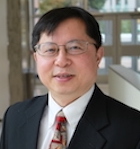Drexel Study Examines Impact of September 11th Attacks on Mental Distress and Diabetes
December 16, 2013
 A new study led by researchers at the Drexel University School of Public Health (SPH) shows that the attacks of September 11, 2001 may have resulted in an increase in the prevalence of diabetes and mental distress. The article discussing this study—which was authored by Dr. Longjian Liu, (right) an associate professor at the SPH, along with coauthors and SPH alumni Wei Zhao, MS ’11, Pam Phojanakong, MPH ’11, Po-Nan Chang, MS ’11 and Shaum M. Kabadi, PhD ’12, and others from Temple University and George Washington University—was recently published in the Journal of Translational Medicine and Epidemiology.
A new study led by researchers at the Drexel University School of Public Health (SPH) shows that the attacks of September 11, 2001 may have resulted in an increase in the prevalence of diabetes and mental distress. The article discussing this study—which was authored by Dr. Longjian Liu, (right) an associate professor at the SPH, along with coauthors and SPH alumni Wei Zhao, MS ’11, Pam Phojanakong, MPH ’11, Po-Nan Chang, MS ’11 and Shaum M. Kabadi, PhD ’12, and others from Temple University and George Washington University—was recently published in the Journal of Translational Medicine and Epidemiology.
Using data from the 1999 to 2009 Behavior Risk Factor Surveillance System in the state of New York, the study compares the age-adjusted prevalence of diabetes and mental distress among residents who lived in New York City with residents who lived in the other counties in the state of New York. The results suggest that residents who lived in New York City had a significantly higher prevalence of diabetes and mental distress than those living in the other counties in the state of New York.
The prevalence of diabetes and mental distress was higher in 2001-2004 than 1999-2000, and then there was a short period of decrease from 2004 to 2006 for residents living in New York City and the other counties. However, the prevalence of diabetes significantly increased from 2006 to 2009, and mental distress also increased from 2007 to 2009 in residents who lived in New York City, but there were non-significant changes for residents who lived in the other counties.
"The increased trend of diabetes and mental distress from 2001 to 2004 may be partly explained by the catastrophic event of the September 11, 2001 attacks. A short-term decrease after 2004 may partly represent a “natural recovery” after an attack. The increases after this decrease may in part be due to the long-term impact of the September 11, 2001 attacks," explained Dr. Liu.